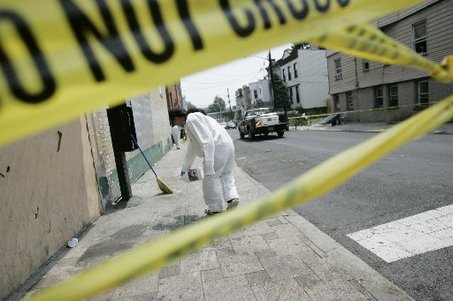 It could be said that on the streets crack addicts, pimps
and high school dropouts may garner sympathy...but a snitch?
It could be said that on the streets crack addicts, pimps
and high school dropouts may garner sympathy...but a snitch?
Negative.
Hood code dictates that tattle-tales are downright dreadful, unforgiveable. Snitches get no love. What most consider courage, slum mentality translates as cultural betrayal.
This very hero/meddler dichotomy forms the basis of Booker T. Mattison's tantalizing novel, Snitch. Andre-the focal character-watches his already-tragic life tumble into a frenzy after he witnesses a murder. It turns out the victim, Dante, and the shooter, Claymont a.k.a. Clops are young men who, like him, grew up poor, fatherless and hard-core. Set in Jersey City during a frigid winter, Snitch's tone matches its backdrop: tough, cold, unforgiving. Yet, within the gloom lies a tender, redemptive journey. The power of God's love melts the story's grime.
The NEWD family was thrilled to host Booker T. Mattison on
the radio show two weeks back. It's always thrilling to meet the mastermind
behind a successful piece. I can think of famous novels that, indeed, tell groundbreaking
stories but, in truth, are horribly written. Uncle Tom's Cabin is one of those
"terrible, great" books. Contrarily, Snitch
readers can appreciate that not only is it a realistic, magnetizing tale, but
it's also well-crafted.
 Snitch is
fast-paced. It has the feel of the movie Crash
on paper coupled with the soothing grace of William P. Young's The Shack. Snitch is a quilt where the
characters weave, lace and lock. It reminds me of typical Jane Austen work.
Snitch is
fast-paced. It has the feel of the movie Crash
on paper coupled with the soothing grace of William P. Young's The Shack. Snitch is a quilt where the
characters weave, lace and lock. It reminds me of typical Jane Austen work.
Snitch is
intellectual. It infuses historical lessons as Khaled
Housseni would in A Thousand Splendid Suns yet introduces the
hip-hop lyricism or urban vernacular of a Sister Souljah's The Coldest Winter Ever.
Snitch is
apologetic. Mattison offers the gospel as well as portrays the ghetto without
being cheesy. He captures the slums without compromising his Christian
standards. No cursing, no sex, no shenanigans.
Now, I won't give away the ending, but I will admit that it's refreshing to swim in a book where brothers reign supreme. Snitch dissects the spectrum of black manhood. Pleasantly, there's no excuse-making or male-bashing in Snitch - just realness. We fall in love with a host of contradictory, fascinating men: Andre, the rare athlete/artist who is an admirable father despite not having one during his formative years; Rock, the gang founder-turned-street evangelist; Clops, a deeply-vulnerable, sensitive yet brutal drug ringleader; Mr. Horton, a-rags-to-riches, elitist yet insecure car dealership owner; Hakeem, a therapist who knows little about growing up in the 'hood but manages to reach thugs.
One shortfall may be that Snitch is a tangle of messages and social science case studies. Notwithstanding, a couple of themes truly spoke to my heart:

Rock's prayer droned on...Andre cuts out onto the street and looks up at the night sky...Good? Prove it then!..."Yo, Dre." Rock pokes his meaty dome out of the meeting place. "Why'd you bounce?"..."Hang on a second." Rock disappeared into the building and returns with a chair in each hand. He's followed by Mark, Strange-O, and finally Frederick. The men encamp around Andre and take a seat. Reluctantly, Andre sits.
This scene so wonderfully speaks to the simplicity of lifestyle evangelism-or being authentic when we share Christ. Rock and the rest of the brothers at the Realness group meet Andre where he is. When Andre goes outside, each of them follow him out to the cold. Eventually, Dre chooses to return to the warmth inside.
Therapy isn't just for our Caucasian brethren
Then, carefully, Andre moves the snub nose of the gun onto his right temple. The sensation of the cold metal on his skin sends shock waves of poison intent through his veins. Andre puts the pistol down thrusts back from the table, and stands. He dries his palms on his jeans and sits on the edge of the bed...Andre looks to the ceiling and places the barrel in the soft pocket under his chin...pulls the trigger...Click.
With the help of a trained professional-Hakeem-Andre is able to process losing his parents in a car accident, his grandmother to Diabetes, his aunt to drugs and his cousin to murder. Like many black men, Andre frowns upon therapy. For this reason, he doesn't seek mental help until it's nearly thrust onto his lap. He remains skeptical even throughout the first few visits. I was touched that Mattison would demonstrate how therapy in conjunction with prayer, accountability and the Word can help black men achieve life makeovers.
 Ana
Guthrie is a super cool chick with a heart for God and love for youth
culture. She doubles as a not-so-naughty librarian and instructor at
Florida Memorial University in Miami, Florida.
Ana
Guthrie is a super cool chick with a heart for God and love for youth
culture. She doubles as a not-so-naughty librarian and instructor at
Florida Memorial University in Miami, Florida.

